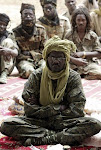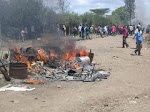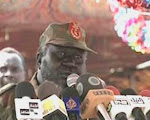"Integral" is a new column that has effectively replaced "Events", a previous column in which Ohiyok D. Oduho wrote his regular features. "Events" column had moved from Sudan Vision English Daily to The Advocate English Daily. It had been dealing with current events in the country and other countries neighbouring the Sudan.
"Integral" thus takes this opportunity to thank the Chairman, Board of Directors and Editor-in-Chief of Khartoum Monitor Daily for approving this space, which officially sanctions "Integral" to become an integral part of Khartoum Monitor Daily.
Unlike "Events", "Integral" would specifically be addressing – amongst others – issues pertaining to disunity of the South Sudanese people. Being an essential part of the whole Sudan, South Sudan needs unity of its people so that its leaders could seriously focus on what the people want and, in unison, approach the Sudanese unity, which shall obviously need a redefinition.
The Sudanese unity now being salvaged was mishandled by its previous leaders and the mess is being cleaned up by the current leadership – a matter that has continued to nurture mistrust between the Sudanese people, especially the pioneers of the comprehensive Peace Agreement (CPA): NCP and SPLM. Redefinition of Sudan's future unity would mean adopting a new method for coexistence so that no Sudanese will ever again be made to feel inferior or superior as was the characteristic of the undefined Sudanese unity, which the CPA is trying to enliven.
A number of South Sudanese have tried their bests to address these issues of disunity. Articles were and continue to be written in newspapers and political rallies addressed. Some of those who addressed these issues of disunity did suggest solutions. Others have been so harsh that they would widen rather than narrow the gap of disunity in South Sudan. The issues of disunity that need serious discussion are many. However, "Integral" would only mention the most common: tribalism, nepotism, land grabbing and occupation, greed for government power, tendency to promote lawlessness by deliberately ignoring to establish law and order and lack of interest in embracing democratic principles – all these could be accommodated in one word – Corruption.
This corruption has – in many ways – victimized people in South Sudan. This victimization has become a common feeling in South Sudan and has undoubtedly alienated the corrupt and their kith and kin from the victimized. But as human beings, however, the victimized are resisting this kind of attitude. Thus the victimizer (corrupt, kith and kin) and the victimized (alienated) are in a serious process of incompatible attitudes directed towards each other and that causes disunity. Disunity breeds conflict; and again if one asks: is conflict the aim of the corrupt, kith and kin in the South? May be not because the corrupt, like other citizens, need to enjoy life and own businesses and conflict is the least they would want to hear or experience.
However, since every tribe in the South is as important and an integral part of the South as the other tribes, all of them need to reexamine themselves, acknowledge their mistakes and accept to conciliate so that unity in diversity could be realised. It should be noted, however, that South Sudanese are not going to unite through dislike, hate and by pitting one against the other. Those wishing to disunite the South have no interest of the South and by extension that of the Sudan at heart.
"Integral" calls on South Sudanese journalists and Sudanese of goodwill to join "Integral" in debating on whether or not it is in the interest of South Sudan and its people that corruption is exposed and corrupt individuals removed from public offices to help the people of South Sudan achieve unity.
"Integral" is open to Sudanese who are interested in the debate. Contributions each in 600 words are welcome. "Integral" will be published on Mondays, Wednesdays and Fridays on this page.
Saturday, June 28, 2008
Disunity of South Sudanese I
Subscribe to:
Post Comments (Atom)







No comments:
Post a Comment